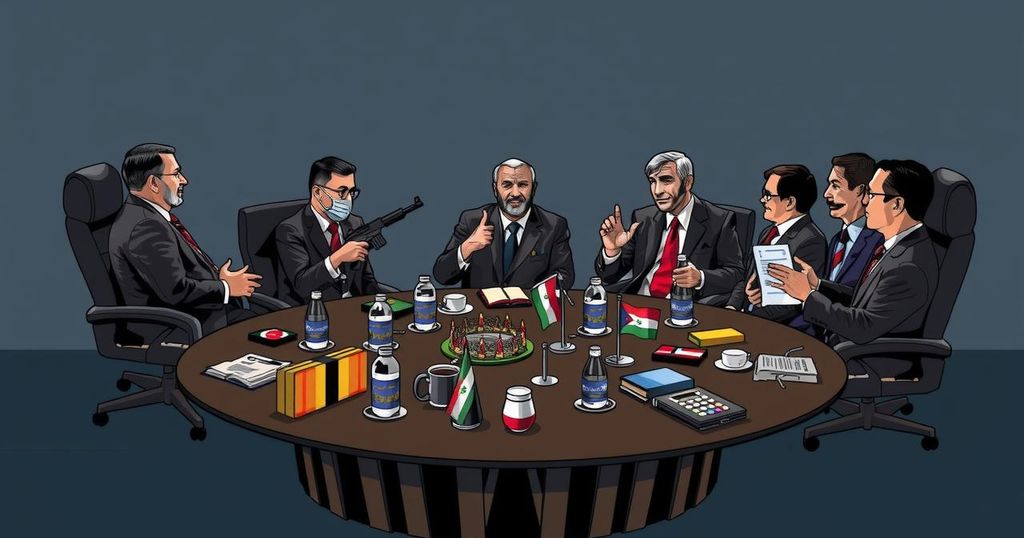World news
ASIA, BRAZIL, DIPLOMACY, ECONOMIC FORUM, EUROPE, EUROPE/ASIA, G20, GAZA, GAZA STRIP, GOLAN HEIGHTS, INTERNATIONAL RELATIONS, ISRAEL, KYIV, LEBANON, LUIZ INACIO LULA DA SILVA, LULA, MILITARY SUPPORT, MODERN ART MUSEUM, NORTH AMERICA, RIO DE JANEIRO, RUSSIA, RUSSIA-UKRAINE WAR, SERGEY LAVROV, SOUTH AMERICA, UKRAINE, UN, UNITED NATIONS, UNITED STATES, US, VLADIMIR PUTIN, WAR, WASHINGTON, WHITE HOUSE
Daniel O'Connor
0 Comments
G20 Leaders Advocate for Ceasefires and Address Global Challenges at Summit
The G20 leaders urged comprehensive ceasefires in Gaza and Lebanon while addressing climate change and poverty. Brazilian President Lula da Silva highlighted that poverty and hunger arise from political decisions. The summit’s focus included the Ukraine conflict and the need for increased climate financing.
Leaders of the G20 major economies convened in Rio de Janeiro, urging for comprehensive ceasefires in both Gaza and Lebanon amidst escalating global tensions. The summit, directed by Brazilian President Luiz Inacio Lula da Silva, emphasized the necessity of addressing poverty and hunger, which he articulated as products of political choices rather than mere scarcity. The final declaration spotlighted the dire humanitarian crises in Gaza and Lebanon, advocating for peace and cooperation on issues such as climate change and equitable taxation of ultra-wealthy individuals. Throughout the summit, the impact of the Ukraine conflict was a dominant topic. G20 leaders welcomed initiatives aimed at achieving a “comprehensive, just, and durable peace” in Ukraine while condemning any forceful attempts at territorial expansion, although the statement notably refrained from directly mentioning Russian aggression. Russian Foreign Minister Sergey Lavrov represented his country in the absence of President Vladimir Putin due to an International Criminal Court arrest warrant. Additionally, the summit saw the launch of a Global Alliance Against Hunger and Poverty, signed by 81 countries, aimed at combating extreme poverty. Lula underscored the importance of political accountability in addressing these global challenges, asserting that poverty and hunger are not inevitable consequences of resource scarcity. The final G20 declaration also recognized the urgent need for significant increases in climate finance, although it fell short of establishing concrete commitments for funding sources.
The G20 summit serves as a critical international forum where leaders of the world’s largest economies gather to address pressing global issues. This recent meeting in Brazil occurred against a backdrop of heightened geopolitical tensions, particularly regarding the conflicts in Ukraine, Gaza, and Lebanon. Additionally, the discussions were influenced by the broader challenges of climate change, poverty alleviation, and the need for equitable taxation policies. Brazilian President Lula’s focus on socio-economic issues reflects a growing recognition among global leaders of the intertwined nature of economic conditions and political decisions.
In conclusion, the G20 leaders’ summit in Rio de Janeiro resulted in a strong call for comprehensive ceasefires in Gaza and Lebanon while underlining the importance of addressing poverty and climate change. Brazil’s leadership, driven by President Lula’s commitment to socioeconomic issues, promotes the notion that these challenges stem from political choices rather than scarcity. As global tensions rise, the summit underscored the need for cooperative solutions and equitable approaches to taxation, envisioning a path toward enhanced humanitarian efforts and sustainable development.
Original Source: www.aljazeera.com




Post Comment